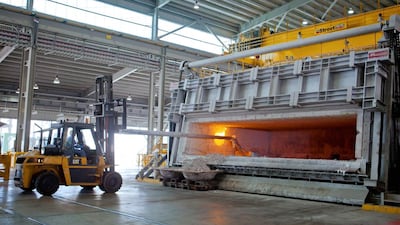State-owned Emirates Global Aluminium (EGA) is spending US$5.2 billion to boost capacity at its smelter in Dubai and build an alumina refinery in Abu Dhabi, a company executive said yesterday.
EGA, the world's fifth-largest aluminium producer, was formed last year with the merger of Abu Dhabi's Emirates Aluminium (Emal) and Dubai Aluminium (Dubal).
EGA is adding about 40,000 tonnes per annum to the 1 million tonnes per annum smelter at Dubal due for start-up in 2017 and it is building a 2.2 million tonnes per annum alumina refinery in Al Taweelah in Abu Dhabi set for start-up in the first quarter of 2018, said Mohammad Abdulrahman, EGA’s vice president, Emal Phase II and major projects.
“To secure the raw material the decision was from the management that we need to have our own refinery to support and produce alumina for ourselves,” he said.
EGA, which reached a capacity of 2.4 million tonnes per annum last year, would like to become the fourth-largest aluminium producer in the next two to three years, he added.
“Today we are running at the fifth position of producing aluminium. Between us and the fourth one is 200,000 [tonnes per annum]. We are trying our best to catch that position in the next two to three years,” said Mr. Abdulrahman.
Aluminium is being increasingly used by car makers, who are favouring the metal in aspects of production over steel because of its lightness, which boosts vehicle fuel efficiency.
EGA, which also owns the bauxite producer Guinea Alumina Corp in Guinea, is also on track to start exporting 12 million tonnes per annum of bauxite mainly to the Al Taweelah alumina refinery in the first quarter of 2018.
In phase two of the Guinea project, EGA plans to build an alumina refinery in the African country to produce 2 million tonnes per annum by 2020, he added.
EGA is a joint venture between the Abu Dhabi sovereign wealth fund Mubadala Development and the Dubai sovereign wealth fund Investment Corporation of Dubai.
dalsaadi@thenational.ae
Follow The National's Business section on Twitter

